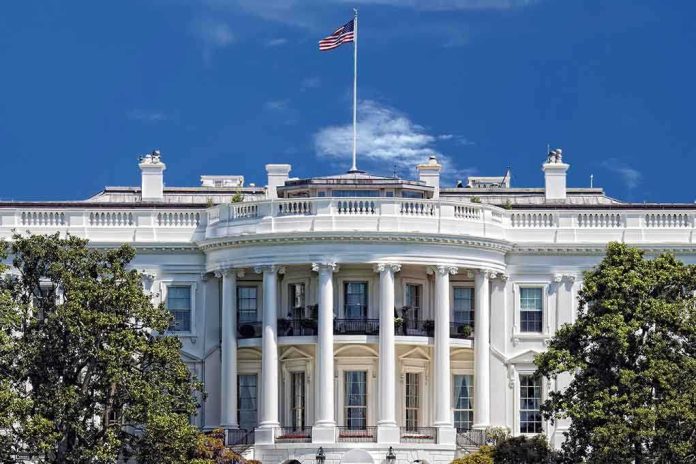
When President Trump invited not one, but two Louisiana college baseball champions to the White House, the East Room erupted not just with applause, but with an audacious challenge that left seasoned athletes and dignitaries equally stunned: a presidential proposal to pit NCAA and NAIA titans head-to-head for ultimate bragging rights.
Story Snapshot
- President Trump honored both LSU Tigers (NCAA) and LSU Shreveport Pilots (NAIA) for their 2025 national championships in an unprecedented dual celebration.
- The ceremony became unforgettable when Trump suggested the two Louisiana teams play each other to settle “who’s best” in college baseball.
- Coaches Jay Johnson and Brad Neffendorf were lauded for their leadership, with Johnson comparing Trump’s work ethic to his own team’s relentless drive.
- The event amplified the role of college sports in American culture, blending tradition, politics, and homegrown competition.
Presidential Recognition Collides with Louisiana Baseball Pride
October 20, 2025, saw the East Room transformed into a field of honor, where the LSU Tigers and LSU Shreveport Pilots—fresh from their respective NCAA and NAIA national championship victories—stood as living proof of Louisiana’s baseball dominance. President Trump took the podium, eyes twinkling with the mischief of a born showman, and delivered more than the usual ceremonial platitudes. He called out the grit, discipline, and “never-quit” attitude that had propelled both teams to the apex of college baseball, drawing a line from diamond heroics to the American spirit itself. What made this gathering historic wasn’t just the teams’ dual presence, but the shared pride and rivalry that Trump stoked, suggesting that only a head-to-head “Super Bowl” of Louisiana baseball could crown the true king.
The ceremonial gravity was underscored by the presence of Jay Johnson and Brad Neffendorf, coaching architects of their teams’ triumphs. Trump, ever the connoisseur of winning, singled out Neffendorf for his Coach of the Year accolade and marveled at Johnson’s ability to keep LSU’s baseball machine humming at full throttle. If the players thought they were just there for a handshake and a photo op, Trump’s challenge upended expectations. The room burst into laughter, but the suggestion echoed a deeper truth: in Louisiana, the hunger to compete doesn’t end when the confetti falls—it only sharpens.
Tradition, Teamwork, and a President’s Playful Provocation
The White House has long been a finishing line where champions are crowned before the eyes of the nation, but rarely has the stage been set for potential new rivalries. Trump’s remarks did more than entertain; they spotlighted the cultural and economic weight college baseball carries in the American South. For the athletes, this wasn’t just recognition—it was validation from the highest office that their sweat and sacrifice matter. The event’s dual nature—a first of its kind for Louisiana—highlighted the state’s unique position atop two separate college baseball pyramids. For the fans and the broader college sports community, the president’s challenge dangled the tantalizing prospect of a “battle of champions,” a hypothetical matchup that instantly became the talk of sports radio and message boards.
The LSU Tigers, accustomed to the national spotlight, found themselves sharing it with their neighbors from Shreveport, whose NAIA title run had been less heralded but no less grueling. Jay Johnson, who led the Tigers through a season of high expectations and higher stakes, paid Trump the ultimate compliment, likening the president’s tireless campaign energy to the Tigers’ own championship mentality. Such mutual respect, exchanged in front of cameras and dignitaries, reinforced the broader message: that great teams and great leaders operate on the same relentless frequency, regardless of their playing field.
Ripple Effects: From East Room Applause to Louisiana’s Main Streets
The aftershocks of the ceremony were immediate and multifaceted. For Louisiana’s baseball programs, the event amplified recruiting buzz and school pride, while local economies braced for a spike in tourism and merchandise sales. The attention also spotlighted the NAIA’s underdog narrative, giving the Pilots a rare moment in the limelight alongside their NCAA counterparts. Analysts and fans alike debated the feasibility of Trump’s proposed game, weighing its potential to ignite a new tradition in college sports. The spectacle also reinforced the political subtext—Trump’s instinct to turn recognition into competition, echoing conservative values of merit, hard work, and friendly rivalry.
In the broader cultural context, the event showcased how sports diplomacy can foster unity and pride even in polarized times. Both teams returned to Louisiana as local heroes, their achievements now woven into the fabric of state lore. For the athletes, the story didn’t end at the White House; it merely opened a new chapter, one in which the bar for excellence—and for playful presidential provocations—had been raised. Whether or not the “Super Bowl” of Louisiana baseball ever materializes, the East Room’s laughter and applause will echo in dugouts and locker rooms for seasons to come.
Sources:
Outkick: LSU Baseball’s Jay Johnson Gives Ultimate Compliment to President Trump




